Iranian Lawmaker Who Had Called For Constitutional Changes Resigns
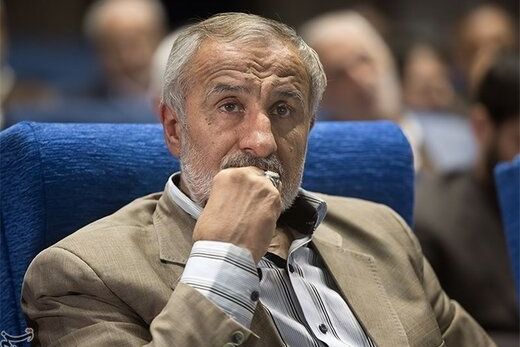
Iranian conservative lawmaker Elias Naderan has resigned asking the speaker of parliament to read his resignation letter in an open session.

Iranian conservative lawmaker Elias Naderan has resigned asking the speaker of parliament to read his resignation letter in an open session.
ISNA news agency reported Sunday that Naderan announced his resignation asking that “the reasons for his decision must be read and the presiding board is not allowed to interpret it.”
He was previously a member of the Islamic Revolutionary Guard Corps (IRGC) and a member of parliament for four terms.
As the political and economic conditions deteriorate for the clerical regime, more disagreements have emerged among influential insiders.
Many on social media believe his resignation is related to the political crisis in the country after more than 100 days of anti-regime protests, triggered in September by the death of Mahsa Zhina Amini in ‘morality police’ custody.
His insistence on reading the text of his resignation in the open session of the parliament would mean that he is critical of some decisions in the country.
However, some others believe his resignation is a tactic to win more perks from the regime and occupy an important post in the government of President Ebrahim Raisi.
Earlier in August, there were unconfirmed reports about Naderan’s resignation after he sharply criticized Parliament Speaker Mohammad-Bagher Ghalibaf.
On November 16, Naderan called for “major structural changes to the system,” demanding changes to the country’s constitution.

Following warnings issued by the western countries about traveling to Iran, the Islamic Republic is to allocate some budget to “counter Iranophobia” in near future.
Iran’s Deputy Tourism Minister Ali-Asghar Shalbafian said Saturday that suggestions have been made for a line of credit for next Iranian year beginning on March 21.
However, he mentioned until the end of current Iranian year on March 20, 2023, the tourism ministry must go ahead with a “limited budget”.
Amid more arrests of dual nationals with Western passports by the Islamic Republic in recent months, several countries have issued warnings to their citizens against traveling to Iran.
The United Kingdom, United States, France, Sweden, Netherland, and Canada advised their nationals not to travel to the Middle Eastern country due to “insecurity” since the nationwide anti-government protests began in Iran in mid-September.
Fearing arrest by Iranian authorities, most foreign tours booked for the New Year and January in popular historic cities have been canceled.
In early November the chairman of the board of Iran's Tour Guides Association, Mohsen Haji-Saeed said some tourists seen in the wrong places and at the wrong time were considered as “spies” and that some foreign nationals had been detained only for taking photographs of the protests “out of curiosity”.
On September 30, Iran’s Intelligence Ministry announced the detention of nine foreign citizens from Germany, Poland, Italy, France, the Netherlands and Sweden. The ministry alleged those arrested had been "on the stage or behind the scenes" of the recent protests.
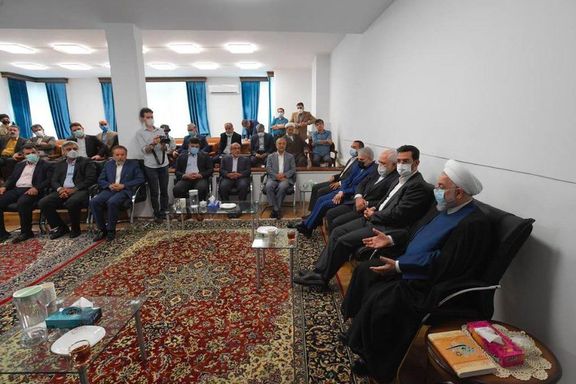
Former Iranian President Hassan Rouhani, who has been mostly silent after he left office in 2021, started to comment on domestic political affairs last week.
Some observers, including a commentary in the leading reformist newspaper Etemad asked whether Rouhani has started a gamble to ensure his political comeback by returning to newspaper headlines after several months. The daily also pointed out in the commentary entitled "Rouhani's rough path to a comeback," that his comments have triggered radical attacks by Iran's conservatives.
Entekhab News, a centrist news outlet close to Rouhani quoted him on December 28 as saying: "I have conveyed some suggestions to the Supreme Leader both in writing and over the phone." Meanwhile, Sara Massoumi, a senior journalist in the reformist daily Etemad on the same date quoted Rouhani as saying: "Some people think that interaction with other countries will lead to infiltration into the Iranian political system. This is not true. It is isolation that leads to infiltration." He added: “In my government we worked hard to keep the JCPOA alive regardless of many attacks on us. We saved the JCPOA by freezing it. The current government could have benefitted from the JCPOA if it wanted to."
According to Etemad, although Rouhani has been silent during the past 18 months except for sending occasional condolence messages, members of the government and other hardliners in Iran often blame him for the country's current problems. Others say that attacks on Rouhani are in fact conservatives’ way of supporting Raisi who is often criticized for his government's weak performance and the deteriorating economic situation.

During the past week, some Iranian politicians suggested that Rouhani might be willing to take part in the parliamentary elections in early 2024. Meanwhile Rouhani and other Iranian politicians have been under pressure by hardliners to support the government and the entire Iranian political system which has been under attack by protesters.
As part of those pressures, Raisi said earlier this week: "Many political figures and regime insiders failed to fulfil their responsibility during the protests." The conservatives reminded that Rouhani's silence is in contrast with his position during the 2019 protests when as president he called for identifying and punishing those who protested to a sudden hike in the price of gasoline.
However, Rouhani's meeting with his former cabinet ministers and aides on December 26 indicated that he is looking for a political comeback with an eye on the impact of the ongoing protests.
During the meeting he extensively talked about the role of women in Iran and their status in Islam. In the same meeting, he also spoke about the JCPOA and how Iran could have benefitted from it had the current government not opposed a deal. Both subjects were likely aimed at bringing Rouhani back to the headlines, and they did.
Nonetheless, although Rouhani tried to appease Khamenei in his remarks, hardliners launched an immediate attack on him saying that his remarks about women showed his liberal views against Islam. Iranian hardliners use the word "liberal" as an insult rather than a political label. Hard-line Mashregh News close to Iranian security forces even said that Rouhani's views were a deviation from the Islamic Republic's official rhetoric.
Farda News, another conservative outlet close to parliament speaker Mohammad Bagher Ghalibaf accused Rouhani of "distorting the truth" and "trying to portray the Raisi administration as a weak government only to conceal his own government's weakness."
Rouhani's possible response to these critics will show if he is really interested in a political comeback.
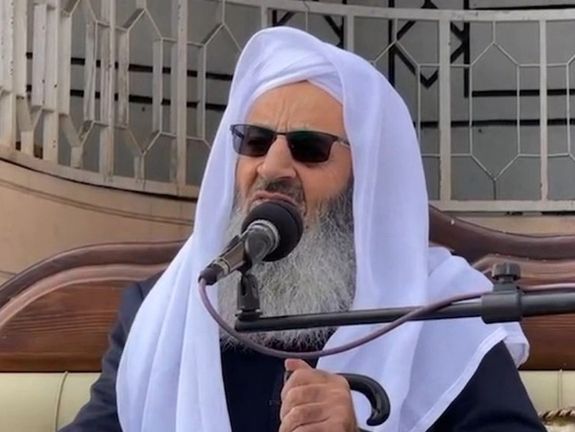
A top Sunni Muslim cleric in Iran has talked about love among all peoples and the importance of women’s rights, in an unprecedented sermon opposing the Shiite regime’s policies.
Several cities in the province of Sistan-Baluchestan, where most Sunni Baluch people live, were scenes of protests against the Islamic Republic on Friday while the regime also organized pro-government rallies in many cities across the country.
This was the 13th consecutive Friday that people in the Sunni-majority cities such as the provincial capital Zahedan and Khash held gatherings and chanted slogans against Supreme Leader Ali Khamenei and the Revolutionary Guard. As usual people poured into streets following Friday prayers.
Mowlavi Abdolhamid, the top religious leader of the Sunni Baluch, led the Friday prayer in Zahedan, and during his sermon criticized the regime’s arrest, sentencing and killing of children.
Elsewhere in his sermons, Abdolhamid debunked the Islamic Republic’s accusation of separatists among the protesters in Sistan and Baluchistan, saying that "We are staunch opponents of separatism. Baluch, Kurd, Arab, Persian, Turk, Turkmen, Lor, Gilak and all other ethnic groups are against separatism.” “All Iranians are one and together. Today, Iran smells of love," he added.
"We sympathize with all Iranians and all Iranians are dear to us; Muslims and non-Muslims, we must respect human rights and humanity. Jews, Christians, Baha'is and others should enjoy human rights. The law has not taken away the nationality of any person; even if he does not accept God," he said.

Pointing out that Baha'is are being persecuted by the Islamic Republic, Abdolhamid called for respect for the rights of "all Iranian citizens." Touching on the issue of apostasy verdicts for the Baha'is, he said that "The new generation of Baha’is were not Muslims who wanted to divert from Islam. They were born non-Muslims so they cannot be sentenced to apostasy."
Fereydun Vahman, Professor Emeritus at Copenhagen University, in an interview with International Friday praised Abdolhamid’s remarks and said he is a rare unifying force among Iran’s religious figures. He also hailed his ideas about equality of women and men as well as the equal rights for Baha’is.
Contrary to the Sunni cleric, Supreme Leader Ali Khamenei’s representatives who led Friday prayers across the country, tried to focus on the pro-government commemorations, known in the state media as the occasion of “Day 9 Epic”, the ninth day of the Persian calendar month of Day, which falls on December 30.
Another issue discussed by Khamenei’s representatives – the so-called Friday prayer leaders – was the third death anniversary of Lieutenant General Qassem Soleimani, the former commander IRGC’s extraterritorial Quds Force. On January 3, 2020, the United States killed Soleimani, as well as the deputy commander of Iraq's popular mobilization units, Abu Mahdi Al Muhandis, in a drone strike near Baghdad International Airport.
The contents of Friday Prayer sermons delivered by clerics appointed by Khamenei in various cities are dictated by two state bodies reporting to his office, officially known as "The Policy-making Council for Friday Prayer Imams" and the "Friday Prayer Headquarters," both dominated by hardliner clerics.
Firebrand Iranian cleric Ahmad Khatami, a member of the Guardian Council, claimed that the Islamic Republic is “invincible,” saying that “dictators want to achieve their goals under the guise of democracy and the defense of women's rights and freedom." He added that the US’ intention to liberate women is to enslave them.
He also described the current wave of protests – which he calls riots – as the deepest conspiracy facing the regime. "In the events, for the first time, the Supreme Leader was insulted, which is actually insulting religion.” Khatami was referring to derogatory slogans chanted by protesters against Khamenei, that anger his religious followers.
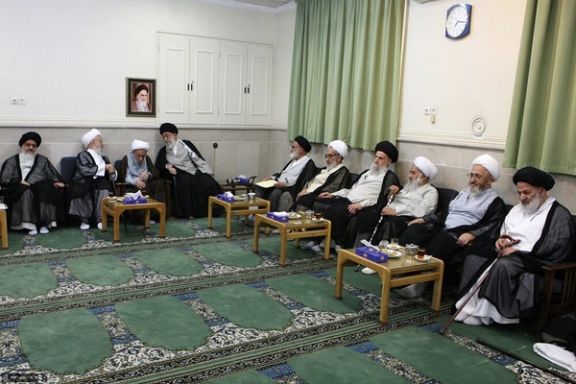
Some of the highest-ranking Iranian clerics have protested to high inflation, sharply rising prices and the inept management of the markets by the government.
The high-ranking clerics have spoken against President Ebrahim Raisi's ultraconservative government, only after the Speaker of the Iranian Parliament Mohammad Bagher Ghalibaf (Qalibaf) who calls himself a neo-conservative went to see them in Qom.
This might be the starting point of a shift from policies based on conspiracy theories inspired by presidential adviser Saeed Jalili to more pragmatic ideas Ghalibaf has been offering as a prelude to what he called a move toward "a new governance" in Iran. Some social media users have called the move "a soft coup by pragmatists against the ultraconservatives," who try to blame most problems on machinations by “enemies”, meaning the United States and its allies.
The move comes while the Iranian government is at its lowest point of popularity after three months of street protests and another sharp devaluation of the Iranian currency in a matter of a week which brought the rate of exchange for the US dollar to 440,000 rials.
The clerics, the "sources of emulation" as they are known in Qom, hold the highest ranks in Iran's brand of Shi'ism and they are supposed to lead the nation by example in all matters of everyday life. Nonetheless, it is not clear how many people follow them and their advice.
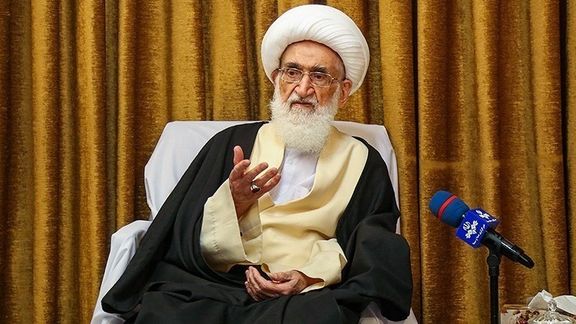
Following meetings with Ghalibaf, Ayatollah Nouri Hamadani, a clerics who has been always silent in the face of whatever that the government has done to the economy, criticized Raisi for bragging about the country's progress and the state of the economy: "No prices have fallen and none of the people's problems have been solved. The only thing that has certainly happened is the devaluation of the Iranian currency."
Ayatollah Nasser Makarem Shirazi who has usually supported the Raisi administration and all the government's hard-line policies, said, "Not only the economic situation is not improving, but the inflation rate has been rising. People ask us why we do not warn the government about the situation. In factو we do warn, but the state television never broadcast our warnings."
Despite his criticism of the government's economic policies, Makarem Shirazi strongly supported the crackdown on protesters.
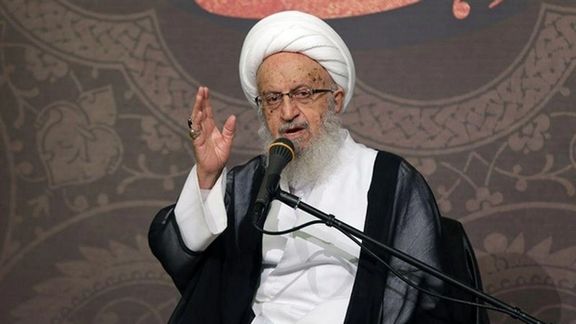
Ayatollah Jafar Sobhani said that "the Raisi administration has been always promising to solve the people’s problems but this promise has never been met." And Ayatollah Abdollah Javadi Amoli referred to inept officials and said, "We should not appoint good but otherwise inept individuals or capable but bad individuals who will embezzle government funds."
One of the first outcomes of the ayatollahs’ remarks against the Raisi administration was the replacement of Iran's Central bank Governor Ali Salehabadi who resigned on Thursday. The new Central Bank governor Mohammad Reza Farzin is no different from Salehabadi in terms of policies. However, the shock in the Iranian market because of rial’s steep fall forced the government to make a change to pretend that it cares. The actual change was a slight boost for the rial.
The Jomhouri Eslami newspaper, a conservative daily critical of the Raisi administration's ultraconservative policies, wrote in an editorial on Thursday that it would be a big mistake by officials to get the message of the ongoing protests wrong. And, not acknowledging the government's errors could be an even bigger mistake."
The daily pointed out that there is no silent majority in Iran. The people are suffering from injustice, economic corruption, high inflation and government's broken promises and they feel humiliated as the government does not seek their political participation. All of this and the government's insistence on its mistakes will inevitably escalate the people's dissatisfaction.
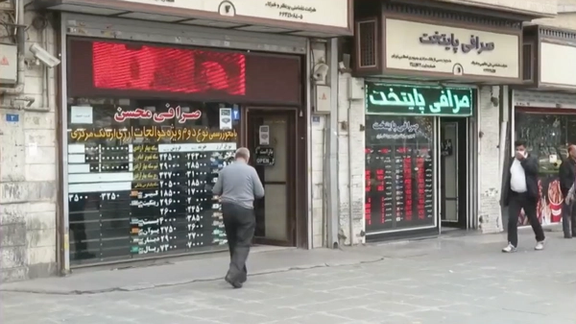
The Islamic Republic’s currency rial has hit yet another low, sieving through the regime insiders who either remain in denial or blame the West for the catastrophic downfall.
As the dollar surpassed 430,000 rials , President Ebrahim Raisi replaced the chief of the Central Bank of Iran and ordered his economic team to come up with ideas to support the collapsing rial.
Raisi appointed Mohammad Reza Farzin as chief banker. Farzin, who has been the CEO of Bank Melli Iran since last year, was also chairman of the board of Karafarin Bank before that.
During the cabinet meeting where Farzin was appointed, Raisi stressed the importance of controlling the value of foreign currencies, asking central bank chief to “manage” the situation.
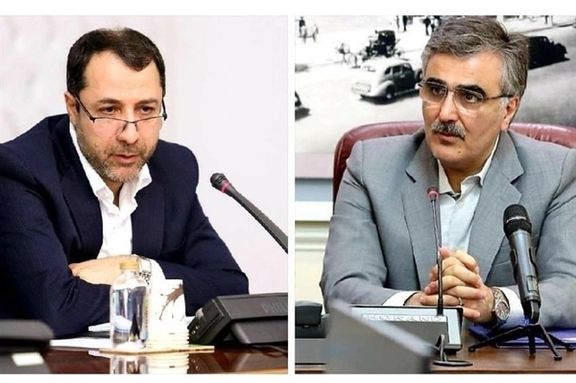
Since the current wave of protests began in Iran in mid-September the rial has fallen to record lows, losing more than a third of its value against the dollar, fueling inflation of around well over 50 percent. The rial has now lost about 80 percent of its value compared to mid-2021 and close to 50 percent since December 2021. Inflation is also skyrocketing. Food prices have jumped much faster than the overall inflation, with some items registering 100-percent increase in one year.
The impact of rial’s devaluation is still not fully felt in the market, but Iran faces the danger of hyper inflation in the coming months.
On Wednesday, Khabar Online, an Iranian conservative website published an article that said the historic devaluation has proven to be divisive among the country’s hardliners. Hardliners in parliament and some in the military have begun harshly criticizing the presidential administration that they were praising just recently.
Numerous officials and insiders, including senior clerics are issuing warnings about the rial’s fall that puts people’s livelihoods in jeopardy, but no one is willing to take responsibility.
Mohammad Eslami, the head of Iran's Atomic Energy Organization, said, "The dollar rise and rial’s fall is one of the plots by the Americans," adding that the US wants people to be fed up with the economic hardships so they took to streets to protest.
He was probably referring to tough sanctions imposed by the United States since 2018, when the Trump administration withdrew from the Obama-era nuclear accord known as the JCPOA. The Biden administration held talks with Iran for 18 months to revive the agreement but the diplomatic effort stalled in late August, because Tehran made unacceptable demands, according to Washington.
Interior Minister Ahmad Vahidi claimed that "There is plenty of foreign currency in the country," a statement which might anger ordinary people even more, who would blame the government for not supporting the rial.
Professor of Economics at California Lutheran University Jamshid Damooei, described the situation as an unprecedented “economic storm” whose root cause is the lack of confidence in the government’s economic policies. He told Iran International that the majority of the Islamic Republic’s income has always been from selling oil, which has been impeded due to US sanctions. Rial’s fall will lead to higher inflation, which in turn will drag the currency lower, he argued.